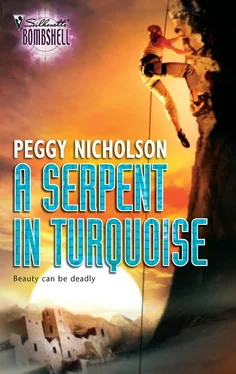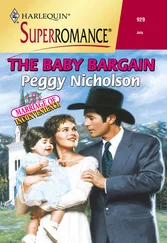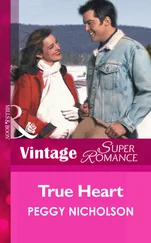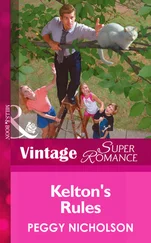To her left, someone stepped out from behind a vine-covered pillar and started down the steps of the porch. A man, but not McCord. This one was short and almost portly. Supported by a cane, he moved with an awkward limping lurch. The doctor? She’d been too befuddled last night to note more than his voice and his suturing skills.
He paused where the first run of steps opened out onto a stone ledge, and swept off the Panama hat that had hidden his face. The gesture revealed ruddy, sun-weathered skin, a bold hawk’s nose on a man of middle years. Plucking a crimson trumpet flower from the buttonhole of his white tropical suit, he called in a loud voice, “Venga, bellezza!” Come, beauty! He placed the stem of the flower between his teeth, spread his arms wide and tipped back his dark head.
He had to be the doctor, Raine told herself, with that voice deep as a canyon, but what on earth was he doing?
If she’d blinked at that moment she’d have missed it; a shimmering ruby-and-emerald colored hummingbird arrowed in to the prize. It hovered before the man’s face, sipped—and flashed away. With a laugh, the doctor drew the plundered blossom from his lips, kissed it lightly and tossed it to the molten air. Donning his hat, he limped toward the next flight of stairs.
“The House of the Hummingbirds,” Raine mused, smiling to herself.
He couldn’t have heard her, yet, he turned, swept his hat off again with a flourish as their eyes met. “Señorita Ashaway, buenas tardes! I trust you slept well?”
“Wonderfully, thank you.” And where was McCord? Still snoozing somewhere down the hall?
“As you can see, I’m off to visit my clínica. Evening rounds. But when I return, I hope you’ll dine with me.” He aimed his cane at a sliver of crescent moon, chasing the sun. “About the hour that she sets, shall we say?”
“With pleasure!” Then, as Raine ducked back into the room, she realized she had nothing but a blanket to wear. Or no, wait—there was her duffel bag and her pack, on the floor beyond the bureau. “Bless you!” she said to the absent McCord. She’d feared it would take a jaws of life to rescue her gear.
Best of all, he’d salvaged her parasol; it lay propped across her bag. Opening it, she sighted along the length of its lead-dipped, aluminum shaft, which didn’t seem unusually thick, unless you really scrutinized it. “Not bent,” she muttered gratefully. A blowgun didn’t work worth a darn with a kink in it.
If anyone did look twice at her parasol—say, a customs agent—the design on its top served to divert his or her attention. An orange Chinese tiger painted in elegant brushstrokes on silk, the cat sat grinning through his whiskers against a sky-blue background. Raine twirled him and smiled. She’d been born in the Year of the Tiger, which meant, according to every place mat she’d ever read in a Chinese restaurant, that she should have been a race car driver. “Next life, maybe.” Raine set it aside and dove into her bag. Since the doctor was a dude, she’d wear something dressy for supper. How about a midnight-blue tank top of heavy satin, plus her calf-length rainbow-hued skirt, with its broomstick pleats that defied every wrinkle? And her opals, of course.
Her hands paused as it hit her. Where was her leather shoulder bag, with her passport, her wallet…and the mug?
“Professor McCord isn’t joining us tonight?” Raine asked, as soon as she decently could. Clearly he was not. There’d been only two places set at the long table before the crackling fire when she came in to supper. She’d made small talk with Dr. Luna while the same elderly servant poured apple cider into green crystal goblets, then brought them a first course of goat cheese with a delectable peasant bread. So far she’d learned about the doctor’s free clinic down the hill. This was a service he provided gladly for the locals, the only medical care available for all this southern region of the canyons. He also ventured out to the surrounding ranchitos, when his patients were too sick to make the journey here.
To his own amiable prodding, Raine had replied simply that she was here on vacation, and that she was a fossil hunter back in the States. Too late to lie now, since she hadn’t a clue what McCord might have told him. Besides which, there was something about this man’s dark gaze that commanded confidences.
“Ah, no, I’m sorry to say. The professor has gone to Creel. Had some arrangements to make, I believe, concerning his next group.”
“His group? I’m afraid he and I didn’t have much time to chat.”
“So I would think! Professor McCord hosts digs for…how shall I say this? For rich amateurs; Americans who would play at archaeology. He teaches them the techniques of excavation, and they help him in his work for a week or two. With many a break for exploration and swimming, when the work grows hot and boring, I understand.” He made an impish face. “But how can I condemn? The professor employs my nephew, Antonio, as his cook and assistant in this enterprise. And I also profit, when these same Americans stop here at my inn, coming and going.”
“I see.” Raine turned her glass in the dancing light cast by a silver candelabra. How could she say that, of course, she meant to pay for his hospitality, without offending the man?
He chuckled and shook his finger playfully as she opened her mouth to try. “Do not even think it, Raine! You are my honored guest, a delight at my table. The only payment I’ll accept is that you listen to an old man’s tales, and that, perhaps you join me later in a game of chess?”
Raine laughed. “Of course, if you like. My father’s been trouncing me all my life at chess, so I’ve got lots of practice in losing.”
“Somehow I doubt that. I smell a—how do you Americans call it? A setup.”
Should she warn him that her father could have been a Grand Master, but he’d preferred to chase dinosaurs around the world?
They paused as the servant returned with bowls of dark, spicy stew—venison cooked with onions, peppers and pozole, the doctor explained. He said something to the woman, and she replied in her soft, oddly clicking speech, then departed.
“She’s a Tarahumara?” Raine asked, once she’d gone.
“She’s a Raramuri,” Luna corrected, the warmth fading from his voice. “Tarahumara is the name the Conquistadores imposed on the tribe, in their arrogance and ignorance. They misheard the word, or they couldn’t pronounce it, or they did not care. Raramuri means the People who run.”
“They run?”
“They’re renowned throughout the world for their endurance. Men and women both. We sent runners to your state of Colorado a while back, for a footrace of one hundred miles through the mountains, at a town called Leadville. The Raramuri raced in their sandals soled with worn-out truck tires, against young professional athletes wearing their fine running shoes. All the same, the Raramuri placed first, second and fifth. The winner was fifty-five years old.”
Raine whistled her appreciation. “And you, sir? Are you one of the People who run?” He’d said “we,” but should she dared to have asked? In some parts of class-conscious Mexico, the word indio was still a term of contempt, connoting poverty and backwardness. In spite of his urbane manners, clearly Luna wasn’t Castilian Spanish, but if he cared to maintain that fiction? Bad move, she told herself as the silence stretched.
“One can only wonder,” he said at last, with cool obscurity. “There were other people here, long before the coming of the Raramuri. The Raramuri retreated to the Barrancas del Cobre in the early 1600’s, fleeing west before the Spanish soldiers and the Jesuits, who would tame them to their missions.”
So you’re not a Raramuri? With his beaked nose and his deep-set eyes below a broad craggy brow, Luna’s features did seem harsher and more rugged than his servant’s. But that might be simply individual variation. Whatever, she’d gotten too personal. “So…if Professor McCord left this morning for Creel, he won’t be back tonight?” And what made her think he’d return at all?
Читать дальше












